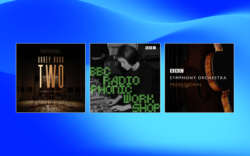Kris Bowers is a GRAMMY, Emmy, and Oscar-nominated film composer and pianist.
Known for his unique blend of classical and jazz influences, Kris Bowers has crafted the music for acclaimed films and TV series including The Wild Robot, Bridgerton, and Green Book, to name a few.
In celebration of the release of Spitfire Audio’s BBC Symphony Orchestra Professional on Rent-to-Own, Bowers sat down with us above to walk through how he approaches character themes, using the orchestral suite to compose music for iconic characters including Jack Torrance from The Shining and Wall-E.
“I think the reason why I genuinely love using Spitfire’s stuff is because it’s so robust,” he tells us. “You can have not just symphonic strings, but different versions of symphonic strings, so that there are some that have a bit more bite for faster things, or others that have a bit more fullness. The spaces might be different in terms of where they were recorded, so that also gives you more variety. And then, to have the whole orchestral palette, or any other instruments that I might be thinking of—it’s helpful that I feel like it’s all right there.”
Watch along to see Kris Bowers’ compositional process in action, and read a few key takeaways he shares over the course of the session below.
Kris Bowers’ tips for composing character themes
1. Start with emotion
“I still start with emotion for the most part,” Bowers says. “I’m looking at what these characters speak to on a psychological level, which will typically connect to sound. If it’s something where they’re incredibly maniacal, violent, and aggressive, there are certain sounds that I think of whenever I want to feel those feelings of anger or rage. I think music does such a great job of capturing that.”
At 1:34 in the video, Bowers puts this idea into action as he approaches his brooding theme for Jack Torrance.
2. Sing what you play
“One of my teachers taught me when I was younger as a jazz pianist to sing what I’m playing,” Bowers recalls. “He was saying that you can’t help but sing what’s naturally inside of you, instead of whatever it is that you practiced.
“So, I tend to sing—even though I’m very bad at singing—just because it makes for a more natural melody.”
3. Have intentional conversations with your collaborators
“I think the thing that’s most challenging about creating a film score is actually the interpersonal dynamic with a new collaborator,” Bowers shares. “In the beginning, we’re having conversations about feelings, but how they’re represented musically is completely subjective. And so I’ll talk to somebody, and say we agree that this should feel nostalgic. We agree that should feel warm. This should feel happy. That should feel sad. This should feel violent. That should feel angry. We say all of these words, but then it’s my job to figure out how that sounds.
“For example, one director I’ve worked with thinks that piano is the most amazing instrument, and another thinks that piano is melodramatic and always trying to make us emotional. And so, I often have conversations with filmmakers about music in general to see how they feel about those kinds of things.
“That’s where I find that temp music is helpful, because then I can ask them what it is about the temp music that they love. What is it that’s missing from it? What is it that’s delivering on those emotions they’re looking for?
“From there, I can understand that the palette I’m creating is informed by our mutual understanding of how to subjectively represent these emotions.”
And there you have it! There’s plenty more to explore in the full video—with that said, what was your favorite tip or insight from Kris Bowers? What other characters would you have liked to see him compose themes for? Let us know in the comments section of the video, and subscribe to the Splice YouTube channel for more musician-led tips, tutorials, and insights.
Try Spitfire Audio’s BBC Symphony Orchestra Professional for free, and then rent-to-own it until it’s yours:
August 4, 2025

.svg)
.svg)



